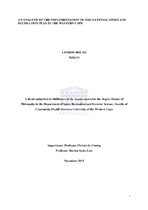An analysis of the implementation of the National Sport and Recreation Plan in the Western Cape
Abstract
It is widely accepted that sport has the potential to serve as a tool for development as well as a catalyst for social and personal change. The National Department of Sport and Recreation (SRSA) has recognized the role that sport can play in building a better society in its recently published document the National Sport and Recreation Plan(NSRP). The aim of this study was to analyse the implementation of the NSRP in the Western Cape and to develop options for the improvement of the implementation of the National Sport and Recreation Plan in the Western Cape. The study analysed the factors that are necessary for an enabling environment to be successful to create an active and winning nation. By linking policy to implementation the study showed that the social benefits of sport can be extended to the broader social community. The fieldwork research was conducted with sport councils, sport federations, academy officials and senior government officials. The study found that the links between local, provincial and national government must be strengthened. The study further found that the level of commitment amongst the various spheres of government is not the same. The will may be there but the actual resources that must be committed is not readily made available. An important finding was that there appeared to be a lack of a nationally coordinated dedicated unit to champion the NSRP within SRSA. No reporting mechanism exists that will indicate to the general public and sport fraternity what the level of compliance is with the broad requirements of the NSRP. The 5-C protocol was used to analyse the NSRP and its current implementation within the Western Cape. Communication was considered as a future addition to augment the5-C protocol. The alignment between various national, provincial and local spheres of government was found to be lacking. It is recommended that the NSRP be brought into the annual performance plans, strategic plans, medium term expenditure framework and performance agreements of departments and senior management. It was found that the voluntary nature of organisations may act as a hindrance to the implementation of the NSRP. It is foreseen that the outcome of the study will assist in benchmarking best practices for implementation. The recommendations proposed by this study will provide options for laying the foundation for the successful implementation of the National Sport and Recreation Plan in South Africa.

